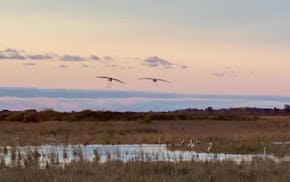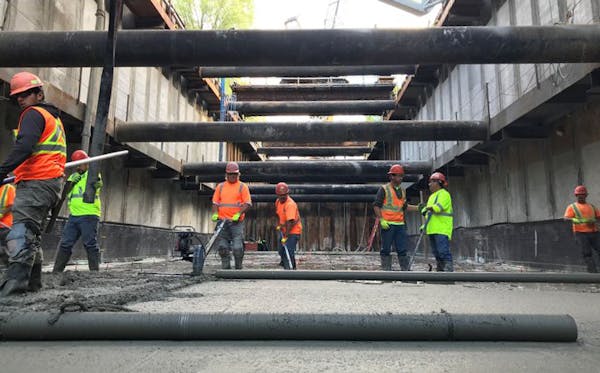The Southwest light-rail line is now expected to cost up to $2.75 billion, with service beginning in 2027 — four years later and millions more than originally anticipated, the Metropolitan Council said Wednesday.
The announcement ends more than a year of uncertainty about the cost and timeline of Minnesota's largest public works project, an extension of the Green Line that will link downtown Minneapolis to Eden Prairie.
The regional planning body said a year ago that "unforeseen conditions" along the Minneapolis stretch of the 14.5-mile route would prolong the project's opening date, at the time listed as 2023.
With the project's contingency fund diminished, it was understood that its estimated $2 billion price tag would likely increase, as well. Met Council officials are now saying the increase could be from $450 million to $550 million.
The most pressing question is who will pay for the project's escalating budget.
"That is a puzzle to be solved," said Met Council Chair Charlie Zelle, Wednesday.
While the Federal Transit Administration (FTA) has already committed $929 million, it is unlikely more money will come from that agency. Zelle hinted there may be other sources of funding but didn't elaborate.
Hennepin County's share of the project largely comes through a half-cent transit sales tax, but that pool of money is intended for multiple transportation projects. Last summer, an additional $200 million of county money was tapped by the project, increasing its cost to $2.2 billion.
Met Council officials mainly attribute the ballooning costs to three issues: construction of a tunnel in Minneapolis' Kenilworth Corridor, addition of the Eden Prairie Town Center Station and erection of a crash-protection wall separating freight and light-rail trains west of Target Field. The milelong wall, which is required by BNSF Railway, will cost about $93 million.
It's been the half-mile Kenilworth tunnel that has most vexed transit planners and builders, and inflated the project's bottom line.
Located on a narrow stretch between Lake of the Isles and Cedar Lake that's just 50 feet wide in spots, the tunnel is some 6 inches away from certain buildings. With a water table that dips 15 to 20 feet, the trench frequently floods.
The council has said "poor soils" in the tunnel area have also contributed to costly delays. And it remains an active freight rail corridor for the Twin Cities & Western Railroad, with trains rumbling by the construction site daily.
Construction of the Southwest line began in 2018, but disagreements have since surfaced between the project's civil construction contractor, Lunda/McCrossan Joint Venture (LMJV), and the Met Council. The project is more than 60% complete.
Zelle said it took the past year to work out a "settlement" with LMJV to nail down the budget and timeline.
"If we kept going under the old contract without addressing these issues, it would have been far worse" on both counts, he said.
The $210 million settlement approved 15-0 by the council includes a $40 million payment to LMJV in the next 60 days to cover costs already incurred by the contractor after a series of council-approved change orders. The pact, not part of a court settlement, is included in the project's overall price.
"To not do anything would be extremely costly," said Council Member Judy Johnson. "It's just a hard decision, but we need to move forward."
Long-simmering distrust and frustration with the council's handling of the project has surfaced in recent days.
During a meeting Wednesday of the Legislative Commission on Metropolitan Government, several Republican lawmakers questioned the Met Council's claim that Southwest has generated $2 billion in economic development along its route. Some said bus service would have been cheaper and more financially viable. Others questioned the need for an expensive rail project at a time when remote work associated with the COVID-19 pandemic has changed commuting patterns.
"How much is too much until we figure this out?" Sen. David Osmek, R-Mound asked. "When do we say, 'This is too much?' "
Joel Alter, director of special reviews for the Legislative Auditor's Office, discussed a review his office conducted related to Southwest's cost overruns and overall management. The review found that the council was often at odds with its main architectural and engineering contractor, AECOM Technical Services (ATS).
ATS helps with change orders that crop up during construction and require independent cost estimates on work that must be bid. To date, there have been 445 construction change orders totaling $203 million.
Two Minneapolis DFL lawmakers, Rep. Frank Hornstein and Sen. Scott Dibble, said they will request a full-fledged audit of the project in the coming legislative session. Both are staunch supporters of public transportation.
Rep. John Petersburg, R-Waseca, cited "ballooning costs to taxpayers, missed deadlines and other turmoil" when he called for a pause on further expenditures for Southwest until a full audit is complete.
"It would be irresponsible to move forward without taking a close look at the mess surrounding this project," Petersburg said in a statement.
At a Minneapolis Park Board meeting last week, members balked at granting the Met Council a four-month extension for a permit to close Cedar Lake Parkway during construction of the tunnel. Some board members said the council has failed to respect residents' concerns about the project.

Want to share info with the Star Tribune? How to do it securely

A Minnesota field guide to snow shovels: Which one's best?
Sign up for Star Tribune newsletters

